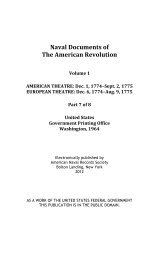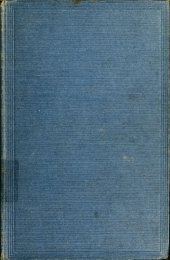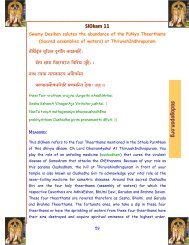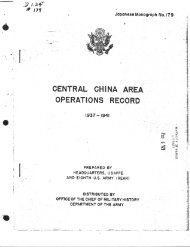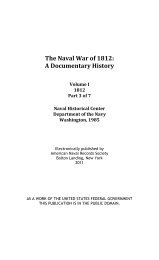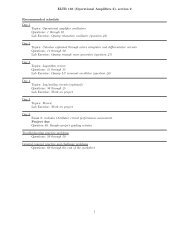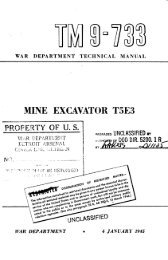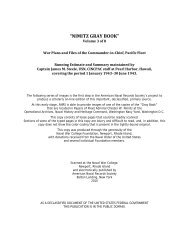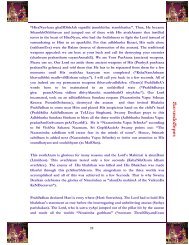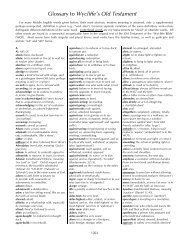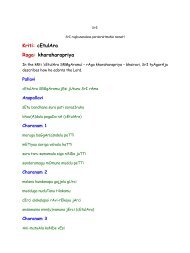Vol. VI, No. 3, March 1992 +-+-+-+-+ - Ibiblio
Vol. VI, No. 3, March 1992 +-+-+-+-+ - Ibiblio
Vol. VI, No. 3, March 1992 +-+-+-+-+ - Ibiblio
Create successful ePaper yourself
Turn your PDF publications into a flip-book with our unique Google optimized e-Paper software.
"The impetus given in extending the cultivation of paddy was<br />
not in the interests of the people of Myanmar Naing-Ngan, but in the<br />
interests of the other colonies and regions of the British. It was<br />
aimed at enabling the companies, which they had monopolized, to gain<br />
huge profits.<br />
"In India, which was British colony, big mutinies broke out<br />
among the troops in 1857-58 and there was unrest in the country which<br />
affected the agricultural work and therefore, huge amounts of rice<br />
from Myanmar Naing-Ngan were exported to India. Moreover, in 1860,<br />
when Abraham Lincoln became President of America, he initiated<br />
efforts for abolition of slavery, and civil war broke out between the<br />
South and the <strong>No</strong>rth and brought about food shortages. Especially in<br />
Carolina State where there was a big food deficit and the people<br />
faced great hardship. The British colonialist government exported and<br />
sold huge quantities of rice from Myanmar Naing-Ngan to those areas.<br />
"By looking at this, it is significant historical fact that<br />
Myanmar Naing-Ngan helped solve the food problem of the people of<br />
India and the United States with the rice from Myanmar Naing-Ngan and<br />
therefore, Myanmar Naing-Ngan had been their benefactor since ancient<br />
times.<br />
"The British colonialist government, in making the cultivation<br />
of paddy to be increased 18-fold within a period of 50 years, they<br />
brought in cheap labour from India into Myanmar Naing-Ngan in large<br />
numbers indiscriminately whtiout any control whatsoever.<br />
"The British imperialists in bringing in people from India into<br />
Myanmar Naing-Ngan, brought in 73,000 Indians in 1862 and after 10<br />
years the number increased to 137,000 in 1872 and then to 246,000 in<br />
1881, according to historical records.<br />
"Throughout their rule, the British imperialists not only did<br />
not take any steps to raise and develop the interests of the entire<br />
nationals of Myanmar Naing-Ngan, but also did not take steps to<br />
protect their interests from being affected. They always stood on the<br />
side of the foreign capitalists and the Chettyars who lent money at<br />
very high interest rates and thus the peasants suffered many<br />
hardships, like those sailing in a raft, and yet going thirsty.<br />
"Thus, under the British imperialist rule, the crime rate in<br />
Myanmar Naing-Ngan increased two-fold from 1904 to 1912, which is<br />
unprecedented, as can be found in the records. In 1910, the Minlaung<br />
Maung Thant uprising broke out in Myinmu area in Sagaing District.<br />
Although the imperialists wrote and ridiculed Minlaung Maung Thant as<br />
craving to become a king and was of unsound mind, in reality this<br />
uprising was the struggle waged by the peasants from Sagaing, Monywa<br />
and Shwebo areas against the colonialists. Similarly, the peasants in<br />
upper parts of Myanmar Naing-Ngan in 1928, made a person from Shwebo<br />
area with the title `Bandaka' as their leader and manoevred to revolt<br />
and attack the colonialists.<br />
"In 1929-31, together with the world economic crisis, the price<br />
of rice in Myanmar Naing-Ngan fell to its lowest and the British<br />
colonialists, who were ruling the country at that time, did nothing<br />
to redeem the situation at all but levied poll tax and land tax by<br />
force. Everybody is aware that due to this, the peasants uprising,<br />
led by a leader of the Wunthanu group Saya San, took place.<br />
"According to the lessons from history, the entire people,<br />
including the mass of the peasantry, are to kindle a high anticolonialist<br />
spirit and it is necessary to oppose and remove all<br />
lackeys of the colonialists...."<br />
"As the year <strong>1992</strong> has been designated as the State's economic<br />
year, it is the duty of the entire peasantry to serve the interests<br />
of the State to cultivate more and produce more. They are to be urged<br />
to grow, not only paddy, but also varieties of oil-seed crops, pulses<br />
and beans, sugarcane, cotton, jute and other crops, under multiple<br />
and mixed cropping system on all cultivable land with might and main<br />
as far as the conditions permit.<br />
"Moreveor, in selling the crops produced by the peasants, they<br />
should do so on priority basis in order to fulfil the requirements of<br />
the State so that the State machinery will run smoothly and



